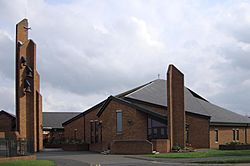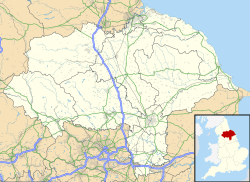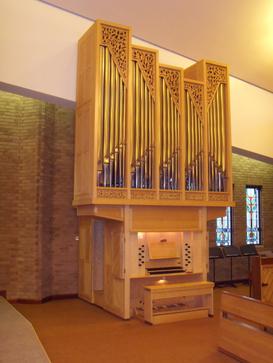Middlesbrough Cathedral facts for kids
Quick facts for kids Saint Mary's Cathedral, Middlesbrough |
|
|---|---|
| Cathedral Church of Saint Mary | |
 |
|
| 54°31′22″N 1°12′49″W / 54.5227°N 1.2137°W | |
| OS grid reference | NZ509144 |
| Location | Middlesbrough |
| Country | England |
| Denomination | Roman Catholic |
| Website | middlesbroughrccathedral.org |
| History | |
| Status | Active |
| Dedication | Saint Mary the Virgin |
| Consecrated | 15 May 1988 |
| Architecture | |
| Functional status | Cathedral |
| Previous cathedrals | Cathedral of Our Lady of Perpetual Succour, Sussex Street |
| Architect(s) | Frank Swainston |
| Groundbreaking | 3 November 1985 |
| Administration | |
| Diocese | Middlesbrough |
| Province | Liverpool |
Saint Mary's Cathedral, also called Middlesbrough Cathedral, is a special Roman Catholic church. It is located in Coulby Newham, Middlesbrough, England. This cathedral is the main church for the Bishop of Middlesbrough. It is part of the Diocese of Middlesbrough, which is like a church district. This district belongs to the larger Province of Liverpool.
Contents
The First Cathedral: A Look Back
The very first cathedral was called the Cathedral Church of Our Lady Of Perpetual Succour. It was built between 1876 and 1878. This church was in the old St. Hilda's area of Middlesbrough, on Sussex Street. When it was first built, it was not a cathedral. It was a large church meant to hold 1,500 people. It served the people of Middlesbrough.
The Diocese of Middlesbrough did not exist until December 1878. So, the church was first part of the Diocese of Beverley. The first bishop of Middlesbrough, Richard Lacy, became bishop there in December 1879.
Why a New Cathedral Was Needed
By August 1984, reports said the old cathedral had problems with its structure. It might even need to be pulled down. However, it was a special historic building, so it could not be easily demolished. Also, many people had moved away from that part of town. The old cathedral became more and more isolated.
Because of these reasons, a new cathedral building was needed. The new Saint Mary's Cathedral was built in Coulby Newham. This is a suburb in the south of Middlesbrough. Building work for the new church started in November 1985.
The End of the Old Cathedral
The old cathedral caught fire in May 2000. It was already in bad shape before the fire. The fire was thought to have been started by children playing inside. Because of the fire damage, the building was pulled down soon after. Today, the Middlesbrough headquarters for Cleveland Police stands on that site.
Saint Mary's Cathedral: The Modern Church
The new cathedral in Coulby Newham was designed by Frank Swainston. Sadly, he passed away after the main plan was agreed upon. His assistant, Peter Fenton, finished the detailed drawings. He also designed the church's furniture. He worked with J. O. Tarren and Professor Patrik Nuttgens to complete the project.
The foundation stone for the new cathedral was blessed on November 3, 1985. This was done by Augustine Harris, who was the Bishop of Middlesbrough at the time. Bishop Harris then officially opened and blessed the cathedral on May 15, 1988.
Design and Features
The cathedral is a modern and bright building. In some ways, it looks similar to the Roman Catholic cathedral in Liverpool. The building has several important parts. These include the sanctuary (the main holy area) and the nave (where people sit). It also has the Blessed Sacrament chapel, the sacristy (where priests prepare), and a church hall. There is also a narthex, which is the entrance porch, and a campanile (bell tower). You can also find a shop inside that sells religious items.
The cathedral was built to fit new church rules. These rules came from the Second Vatican Council. The council asked that new churches have an altar that everyone can clearly see. They also wanted the church services to be heard by everyone.
Music at the Cathedral
Music is a very important part of services at Saint Mary's Cathedral.
The Cathedral Organ
An expert, Dr. John Rowntree, helped decide what kind of organ the cathedral needed. The organ was built by a company called Schumacher of Europe, from Belgium. This organ has two keyboards and pedals. It has 16 stops, which control the different sounds. The organ's case is made of ash wood. This matches the other wooden items in the cathedral. Its unique shape fits well with the building's design.
You can find more details about this organ on the National Pipe Organ Register.
Cathedral Choirs
The cathedral has a special group called the Choral Foundation. This group helps keep the music tradition alive. It is led by the Cathedral and Diocesan Director of Music. The choirs that are part of this group include:
- Cathedral Choir: This choir has older singers, including students and adults.
- Cathedral Consort: This is another special choir.
- Cathedral Junior Choristers: This choir is for younger singers.
There is also a Diocesan Choir. This choir is made up of singers from all over the Diocese. They sing at big events for the Diocese. While not one of the main Cathedral Choirs, they often sing at the Cathedral. They have also started singing in other places across the Diocese.
Choral Service Schedule
Currently, the Cathedral Choir sings for the main Sunday morning service, called Solemn Mass. On Wednesday evenings, there is a service called Choral Vespers and Benediction. These services are led by the other choirs from the Choral Foundation.
Other services at the cathedral also include music. However, these are usually led by an organist or a single singer, called a cantor.
Who Leads the Music?
- Mr. Timothy Craig Harrison (2010–2021)
- Mr. Steven Maxson (2022–present)
See also
 In Spanish: Catedral de Santa María (Middlesbrough) para niños
In Spanish: Catedral de Santa María (Middlesbrough) para niños



